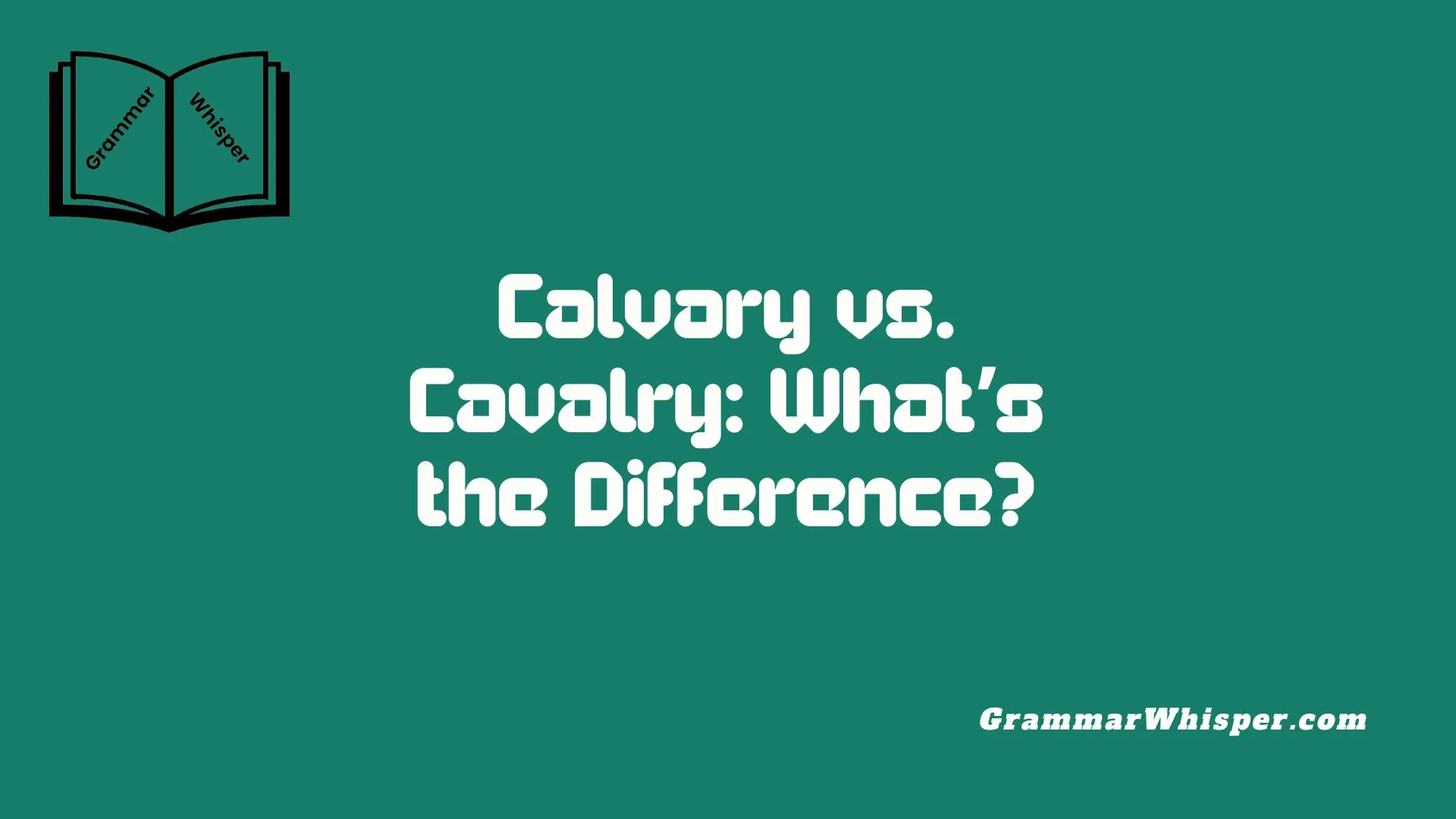I still remember stumbling over certain English words as a kid. Some looked alike, others sounded nearly identical, but their meanings couldn’t have been more different. One confusing pair that always stuck with me: Calvary vs. Cavalry. They’re classic homophones, or more specifically, near-homophones – they sound almost the same, but carry entirely separate meanings. And yet, mix them up, and suddenly you’re not just making a harmless error. You’re risking real blunders, especially in writing or public speaking. I’ve even heard people cause unintended disrespect in historical or religious settings just by choosing the wrong word.
To a language lover, that kind of mix-up is fascinating. Sure, the spelling is close, and their semantic roles are clear once explained. But the confusion sticks around because we often process by sound first. To communicate precisely, understanding the correct usage is key. Here’s the breakdown: Calvary is the hill where Jesus was crucified, rooted deeply in Christian tradition. On the other hand, Cavalry refers to mounted military forces. The emotional weight both carry is real, just in very different contexts. So when you get it right, it’s not just about good grammar – it’s about respecting meaning, history, and faith.
Understanding the Common Confusion
The confusion starts with a tiny letter swap:
- Cavalry – refers to mounted or mechanized soldiers
- Calvary – refers to the hill outside Jerusalem where Jesus was crucified
People often write “The Calvary charged in!” when they mean horse soldiers. It still happens in print and online – sometimes even among professionals. This mistake isn’t mere grammar. It changes the meaning entirely, and it reveals how easily we trip over similar-sounding words.
The Origins and Meanings Explained
Why do these words look so similar? The roots tell the story:
- Cavalry comes from the Latin caballus, meaning “horse,” passed to Old French as cavalerie, then Middle English.
- Calvary comes from Latin Calvaria, meaning “skull,” which was translated from Aramaic Golgotha. It refers to the site of Christ’s crucifixion.
These roots have nothing in common – except how careless writing, colloquial speech, and autocorrect have muddled them over centuries.
What Does Cavalry Mean?
Cavalry represents a military tradition:
- Historically, cavalry soldiers rode horses into battle.
- Today, cavalry often refers to armored or air-mobile units like tanks and helicopters.
Key aspects of cavalry:
- Mobility – fast movement on the ground or air
- Reconnaissance – gathering battlefield intel
- Strike power – shock troops capable of overwhelming forces
Examples of cavalry:
- The U.S. Army Cavalry Regiment dates back to the 18th century.
- In WWII, Germany’s Panzer divisions served a similar role to mounted cavalry.
- Modern armies use terms like air cavalry to describe helicopter-mounted units.
So when you talk about cavalry, think of speed, strategy, and military might – not religion or sacred landmarks.
The Historical Significance of Calvary
By contrast, Calvary holds deep religious significance:
- It refers to the hill outside Jerusalem where Jesus was crucified.
- The name comes from the Latin Calvariae Locus, meaning “place of the skull.”
Why Calvary matters:
- It symbolizes suffering, sacrifice, and redemption.
- Christian art and liturgy reference Calvary regularly – including hymns like “At Calvary” and “By the Cross”.
- Churches, ministries, and schools often use the name “Calvary” to reflect their mission.
Using “Calvary” in a non-religious context shows a lack of awareness – and possibly respect for its spiritual weight.
Modern Usage of Calvary and Cavalry
These words continue to stand apart in contemporary language:
- Cavalry shows up in military contexts and strategy games:
- “Call in the cavalry!” means request help or reinforcements.
- In video games, cavalry units provide speed or flanking advantage.
- Calvary remains important in religious ceremonies:
- “We are making a pilgrimage to Calvary in Holy Week.”
- Churches like Calvary Chapel and Calvary Baptist use the name to convey spiritual identity.
Calvary in Contemporary Culture
The word Calvary resonates in Christian art, faith, and ministry:
- Calvary Church in Colorado Springs has over 20,000 weekly attendees. (Latest 2024 data via church website)
- “The Calvary” is a genre of gospel music that reflects themes of sacrifice and salvation.
- Easter sermons, Passion plays, and liturgical readings regularly reference Calvary, underscoring its spiritual depth.
Calvary isn’t a relic – it’s alive in cultural and religious expression today.
Pronunciation and Why It Matters
Pronunciation sets these words apart – though only slightly:
| Word | Phonetic | Emphasis | Main Difference |
| Cavalry | /ˈkævəlri/ | CAV‑uhl‑ree | The second vowel is a schwa (/ə/) |
| Calvary | /ˈkælvəri/ | KAL‑vuh‑ree | The “l” sound dominates the second syllable |
Native speakers mostly pronounce them similarly. But getting it wrong in writing – or public speaking – can raise an eyebrow. Imagine hearing “The cavalry has ascended to Calvary.” It’s a slip – and a serious one.
Common Pronunciation Challenges
Certain accents or hurried speech can blur the words:
- In Southern U.S. English, the vowels may merge, worsening confusion.
- Speech-to-text tools (like Siri or Zoom auto-captions) might transcribe “robust cavalry unit” as “Robust Calvary unit” – if context is missing.
Many professionals in theology, history, or military studies stress correct usage to maintain credibility in writing and speech.
How to Remember the Difference
Use these memory aids:
- Mnemonic:
- “Cavalry” has an A for armored or arrow, tied to battle.
- “Calvary” has an L for Lord, tied to Christ.
- Word association:
- Cavalry = charge, horses, battlefield.
- Calvary = cross, crucifixion, redemption.
- Flashcard method:
- One side: “The ____ arrived to rescue the troops.”
- Other side: “cavalry” with picture of horse soldiers.
These simple tricks help reinforce correct usage – especially under pressure.
Side-by-Side Comparison Table
| Feature | Calvary | Cavalry |
| Part of Speech | Proper noun | Common noun |
| Meaning | Crucifixion hill in Jerusalem | Mounted or mechanized soldiers |
| Etymology | Latin Calvaria | Latin caballus → French |
| Domain | Religious | Military, defense, gaming |
| Pronunciation | /ˈkælvəri/ | /ˈkævəlri/ |
| Usage Today | Churches, hymns, Easter | Armies, video games, phrases |
Final Thoughts
Confusing Calvary with cavalry isn’t just a small slip – it changes your meaning entirely. One word invokes history, horses, and the battlefield. The other evokes faith, sacrifice, and sacred ground. Whether you’re writing, speaking, or teaching, using the right word helps you communicate clearly and respectfully.
If you’re discussing soldiers, reinforcements, or historic battles, cavalry is your word. If you’re talking about the place of crucifixion in Christian tradition, it’s Calvary.
With a bit of context and some memory tricks, you’ll never mix them up again. Words matter – and in this case, a single letter carries centuries of meaning.
FAQs
What’s the easiest way to remember the difference between Calvary and Cavalry?
A simple trick is this: Cavalry has an “A” for “Army”. Think of soldiers, horses, or tanks. Calvary has an “L” for “Lord” – referring to the place where Jesus was crucified. Associating one with battle and the other with the Bible makes it easier to keep them straight.
Are Calvary and Cavalry ever used interchangeably?
Technically, no. They have completely different meanings and should not be used interchangeably. However, people often confuse them in speech or casual writing, especially when relying on autocorrect or speech-to-text tools. But using them correctly improves clarity and shows attention to detail.
Is Calvary always capitalized?
Yes – Calvary should be capitalized because it’s a proper noun referring to a specific place. Similar to names like “Jerusalem” or “Bethlehem,” it’s tied to a unique, historical location. Cavalry, unless it’s part of a unit name (like “1st Cavalry Division”), is lowercase.
Can “cavalry” refer to modern military units?
Absolutely. While it originally described horse-mounted troops, cavalry has evolved. Today, “cavalry” includes armored and air mobile units – like tanks and helicopters. For example, the U.S. Army still uses the term for reconnaissance and rapid deployment forces.
Why do people mix them up so often?
They sound very similar – especially in casual conversation. Both are three-syllable words starting with a “C” and ending with a “ree” sound. And since they rarely appear in the same context, many people don’t realize the subtle but important difference. Speech-to-text software also frequently misidentifies one for the other.











